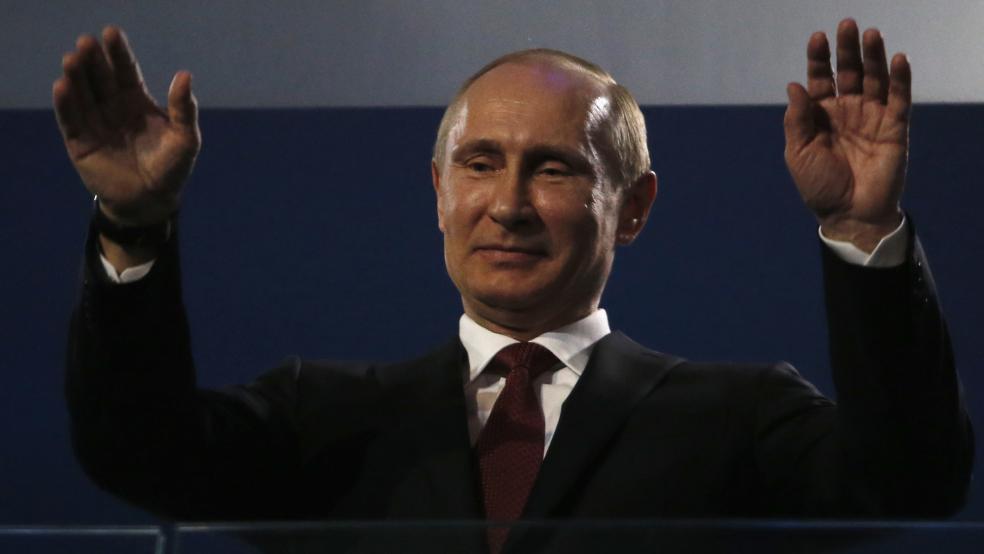Democrats and Republicans are proposing different plans – one financial, one military – for dealing with Russia’s territorial expansions in Europe.
More than a month after President Vladimir Putin sent Russian troops into Crimea, lawmakers on both sides of the aisle finally joined together to pass legislation providing $1 billion in loan guarantees to Ukraine and imposing additional sanctions on certain Russians. President Obama signed the bill into law on April 3.
Since then the parties have become divided.
Related: Intelligence Chair Fears Putin Has New Target: Armenia
A group of House Republicans yesterday backed legislation that would halt all military and nuclear security cooperation between Russia and the U.S. until Russian troops leave Crimea, according to a summary from the office of Rep. Michael Turner (R-OH), the bill’s sponsor. The measure also would call for expanding NATO to nearby countries such as Montenegro, while requiring a plan for U.S. military assistance to Ukraine for defensive purposes.
“The Obama Administration has been unable to counter this escalation of Putin’s aggressive posture,” Turner, chairman of the House Armed Services Subcommittee on Tactical Air and Land Forces, said in statement. “Instead, they have been defensive, unsure, and unable to change Putin’s course of action. This legislation outlines specific measures that can be taken up immediately and that will signal a fundamental shift in U.S. strategy.”
Earlier this week, Senate Republicans took the administration to task, even as Secretary of State John Kerry assured lawmakers that the U.S. is prepared to respond with harsher sanctions if Russia expands into eastern Ukraine, where he said Russian supporters are contributing to civil unrest.
Related: Why Germany and Poland Are Winners in the Ukraine Crisis
“No one should be fooled, and believe me no one is fooled, by what could potentially be a contrived pretext for military intervention just as we saw in Crimea,” Kerry said. “The United States and our allies will not hesitate to use 21st century tools to hold Russia accountable for 19th century behavior.”
But it’s the choice of tools, namely the administration’s preference for sanctions instead of military aid that angers many congressional Republicans.
Sen. John McCain of Arizona berated Kerry for the administration’s focus on economic sanctions instead of military assistance.
“I’d like to know why it is not at least under serious consideration to give them some defensive weapons with which to defend themselves,” McCain asked Kerry, who was testifying before the Senate Foreign Relations Committee, a panel he once chaired. “My hero Teddy Roosevelt used to say, ‘Talk softly and carry a big stick.’ What you’re doing is talking strongly and carrying a very small stick. In fact, a twig.”
Related: Russia’s Move in Crimea Sends China a Dangerous Message
Kerry said the U.S. is “currently working with Ukraine to determine their requirements across the entire security sector.”
That waiting period not only allows Republicans to introduce legislation that contrasts with the administration’s approach, it also gives Russian President Vladimir Putin more time to plot his next move.
“We seem to be in a very reactive mode,” said Michaela Dodge, a defense policy analyst at the Washington-based Heritage Foundation. “We have not been taking any such actions yet. Rather, we seem to be deciding what to do if Russia takes what is left of Ukraine.”
Dodge said that even proponents of military assistance have their limits. “There is no appetite whatsoever to go to war over Ukraine,” she said.
Related: How Putin Awoke NATO’s Sleeping Giant
One thing Democrats and Republicans agree on is that the U.S. and its European allies need to be consistent in their opposition to Russia’s military incursions.
“To counter Vladimir Putin's aggressive actions, it is crucial for America and the West to speak with a strong and united voice in support of Ukraine and its territorial integrity,” Sen. Ron Johnson (R-WI) said on March 27.
This week, he struck a more divisive tone, saying that while visiting with Ukraine Prime Minister Arseniy Yatsenyuk last month he could “sense the disappointment that the United States wasn’t even willing to offer small arms and ammunition to support the courageous people of Ukraine.
“The reason we heard from this administration they weren’t willing to provide arms is we thought it would create a provocation,” Johnson said. “Well, he doesn’t need a provocation. What Vladimir Putin needs is deterrence.”
Top Reads from The Fiscal Times:





